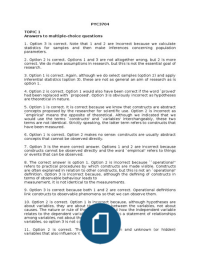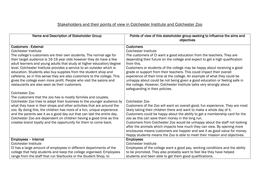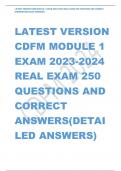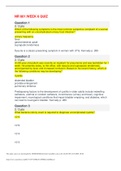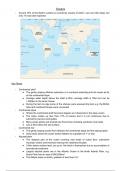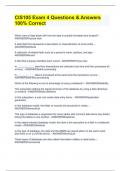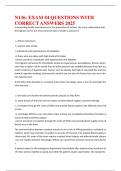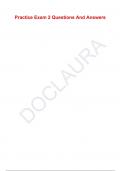PYC3704
TOPIC 1
Answers to multiple-choice questions
1. Option 3 is correct. Note that 1 and 2 are incorrect because we calculate
statistics for samples and then make inferences concerning population
parameters.
2. Option 2 is correct. Options 1 and 3 are not altogether wrong, but 2 is more
correct. We do make assumptions in research, but this is not the essential goal of
research.
3. Option 1 is correct. Again, although we do select samples (option 2) and apply
inferential statistics (option 3), these are not as general an aim of research as is
option 1.
4. Option 2 is correct. Option 1 would also have been correct if the word `proved'
had been replaced with `proposed'. Option 3 is obviously incorrect as hypotheses
are theoretical in nature.
5. Option 1 is correct. It is correct because we know that constructs are abstract
concepts proposed by the researcher for scientific use. Option 2 is incorrect as
`empirical' means the opposite of theoretical. Although we indicated that we
would use the terms `constructs' and `variables' interchangeably, these two
terms are not identical. Strictly speaking, the latter term refers to constructs that
have been measured.
6. Option 1 is correct. Option 2 makes no sense: constructs are usually abstract
concepts that cannot be observed directly.
7. Option 3 is the more correct answer. Options 1 and 2 are incorrect because
constructs cannot be observed directly and the word `empirical' refers to things
or events that can be observed.
8. The correct answer is option 1. Option 2 is incorrect because ``operational''
refers to practical procedures by which constructs are made visible. Constructs
are often explained in relation to other constructs, but this is not an `operational'
definition. Option 3 is incorrect because, although the defining of constructs in
terms of observable behaviour leads to
measurement, it is not identical to the measurements.
9. Option 3 is correct because both 1 and 2 are correct. Operational definitions
link constructs to observable phenomena so that we can observe them.
10. Option 2 is correct. Option 1 is incorrect because, although hypotheses are
about variables, they are about the relation between the variables, not about
causes. The nature or rule of the relation is about how the independent variable
relates to the dependent variable. An hypothesis is a statement of relationships
among variables, not about the nature of
variables, so option 3 is not correct.
11. Option 2 is correct. There are many known and unknown (or hidden)
variables that also influence Y.
1
, 12. The correct option is 1. The independent variable is that variable which
affects the dependent variable; or, conversely, the dependent variable depends
on the independent variable.
13. Option 1 is correct: as the values of the independent variable change, the
dependent variable should also change (if the hypothesis is valid). Option 2 is
incorrect because this particular hypothesis does not state that one variable
`causes' another.
14. Option 3 is the correct answer. The observation that `a child hits another
child' can be considered to be a behavioural consequence or manifestation of the
construct `aggressive behaviour'. We infer that the behaviour is the consequence
of the construct, and the construct is made visible (manifest) by the behaviour.
15. Option 2 is correct. Hypotheses that are true only for one or more samples
are of no value in building theories that will allow us to understand and explain
behaviour. Option 3 is incorrect as hypotheses are not stated for samples.
16. The correct option would be option 2. To say it is `a segment of a population'
as option 1 claims, seems to imply that a specific subgroup is deliberately
chosen, and the whole idea is that the sample should represent the population as
well as possible. Option 3 is not true of all samples. Random samples are
desirable, but are not always possible or practical.
17. The correct option would be option 3. An inference is not the hypothesis, it is
a conclusion based on information, where you state that something you have
found has more general implications. It is not an hypothesis (as option 1
suggests), although you may use an inference to develop an hypothesis.
For example, on the basis of the popularity of TV dramas that contain high levels
of violence, you infer that people are entertained by watching violent behaviour.
You can then turn this into an hypothesis for further study. `An inspired guess', as
stated in option 2 may be a good description of an hypothesis, but not for an
inference, which is based on specific information.
18. Here the best answer would be 2. `Operationalisation' is where you make the
construct (which is usually an abstract concept, so it is difficult to observe it
clearly) visible by finding some suitable way to measure it. You need it to be able
to test an hypothesis, but it is not in itself `the process of forming an hypothesis',
as suggested in option 1. Option 3 `finding a practical operation or procedure to
do the research' is a bit too vague, and would be more suitable as a definition of
research design.
19. The correct answer is option 1. The fact that constructs are usually
abstractions does play a role in making them latent, but it does not imply that
`abstract' and `latent' mean the same thing, as suggested in option 2. Option 3
is true of constructs in general, but this is not related to the fact that they are not
directly observable.
20. The correct answer is option 3. Options 1 and 2 are false because while the
word `parameters' does refer to descriptive statistics, it does not refer to all
descriptive statistics. It is used only for those descriptive statistics that relate to
the population, not to those that describe aspects of the sample.
2
TOPIC 1
Answers to multiple-choice questions
1. Option 3 is correct. Note that 1 and 2 are incorrect because we calculate
statistics for samples and then make inferences concerning population
parameters.
2. Option 2 is correct. Options 1 and 3 are not altogether wrong, but 2 is more
correct. We do make assumptions in research, but this is not the essential goal of
research.
3. Option 1 is correct. Again, although we do select samples (option 2) and apply
inferential statistics (option 3), these are not as general an aim of research as is
option 1.
4. Option 2 is correct. Option 1 would also have been correct if the word `proved'
had been replaced with `proposed'. Option 3 is obviously incorrect as hypotheses
are theoretical in nature.
5. Option 1 is correct. It is correct because we know that constructs are abstract
concepts proposed by the researcher for scientific use. Option 2 is incorrect as
`empirical' means the opposite of theoretical. Although we indicated that we
would use the terms `constructs' and `variables' interchangeably, these two
terms are not identical. Strictly speaking, the latter term refers to constructs that
have been measured.
6. Option 1 is correct. Option 2 makes no sense: constructs are usually abstract
concepts that cannot be observed directly.
7. Option 3 is the more correct answer. Options 1 and 2 are incorrect because
constructs cannot be observed directly and the word `empirical' refers to things
or events that can be observed.
8. The correct answer is option 1. Option 2 is incorrect because ``operational''
refers to practical procedures by which constructs are made visible. Constructs
are often explained in relation to other constructs, but this is not an `operational'
definition. Option 3 is incorrect because, although the defining of constructs in
terms of observable behaviour leads to
measurement, it is not identical to the measurements.
9. Option 3 is correct because both 1 and 2 are correct. Operational definitions
link constructs to observable phenomena so that we can observe them.
10. Option 2 is correct. Option 1 is incorrect because, although hypotheses are
about variables, they are about the relation between the variables, not about
causes. The nature or rule of the relation is about how the independent variable
relates to the dependent variable. An hypothesis is a statement of relationships
among variables, not about the nature of
variables, so option 3 is not correct.
11. Option 2 is correct. There are many known and unknown (or hidden)
variables that also influence Y.
1
, 12. The correct option is 1. The independent variable is that variable which
affects the dependent variable; or, conversely, the dependent variable depends
on the independent variable.
13. Option 1 is correct: as the values of the independent variable change, the
dependent variable should also change (if the hypothesis is valid). Option 2 is
incorrect because this particular hypothesis does not state that one variable
`causes' another.
14. Option 3 is the correct answer. The observation that `a child hits another
child' can be considered to be a behavioural consequence or manifestation of the
construct `aggressive behaviour'. We infer that the behaviour is the consequence
of the construct, and the construct is made visible (manifest) by the behaviour.
15. Option 2 is correct. Hypotheses that are true only for one or more samples
are of no value in building theories that will allow us to understand and explain
behaviour. Option 3 is incorrect as hypotheses are not stated for samples.
16. The correct option would be option 2. To say it is `a segment of a population'
as option 1 claims, seems to imply that a specific subgroup is deliberately
chosen, and the whole idea is that the sample should represent the population as
well as possible. Option 3 is not true of all samples. Random samples are
desirable, but are not always possible or practical.
17. The correct option would be option 3. An inference is not the hypothesis, it is
a conclusion based on information, where you state that something you have
found has more general implications. It is not an hypothesis (as option 1
suggests), although you may use an inference to develop an hypothesis.
For example, on the basis of the popularity of TV dramas that contain high levels
of violence, you infer that people are entertained by watching violent behaviour.
You can then turn this into an hypothesis for further study. `An inspired guess', as
stated in option 2 may be a good description of an hypothesis, but not for an
inference, which is based on specific information.
18. Here the best answer would be 2. `Operationalisation' is where you make the
construct (which is usually an abstract concept, so it is difficult to observe it
clearly) visible by finding some suitable way to measure it. You need it to be able
to test an hypothesis, but it is not in itself `the process of forming an hypothesis',
as suggested in option 1. Option 3 `finding a practical operation or procedure to
do the research' is a bit too vague, and would be more suitable as a definition of
research design.
19. The correct answer is option 1. The fact that constructs are usually
abstractions does play a role in making them latent, but it does not imply that
`abstract' and `latent' mean the same thing, as suggested in option 2. Option 3
is true of constructs in general, but this is not related to the fact that they are not
directly observable.
20. The correct answer is option 3. Options 1 and 2 are false because while the
word `parameters' does refer to descriptive statistics, it does not refer to all
descriptive statistics. It is used only for those descriptive statistics that relate to
the population, not to those that describe aspects of the sample.
2

